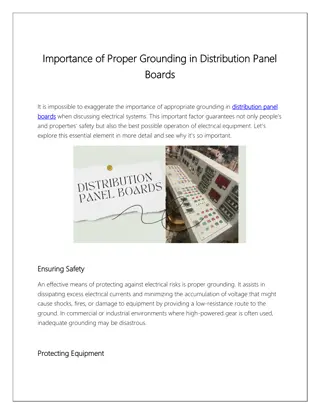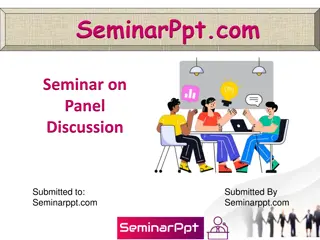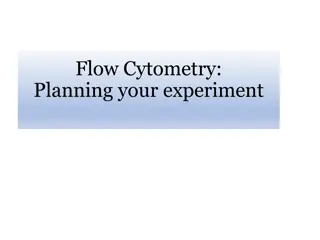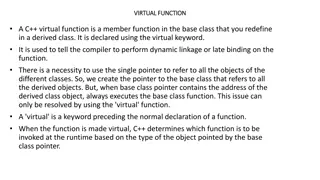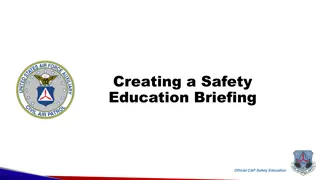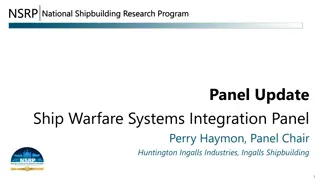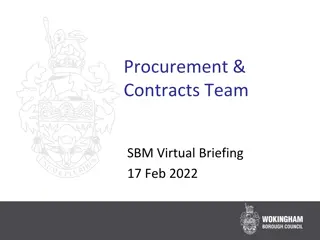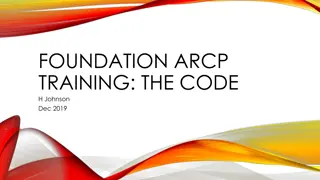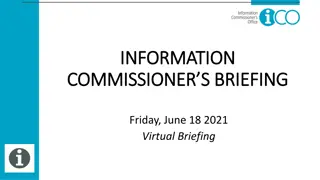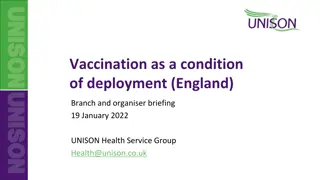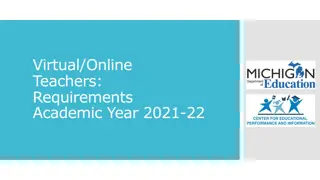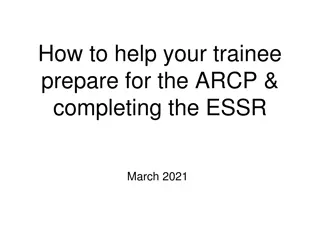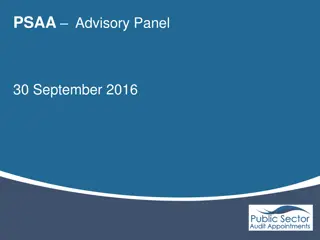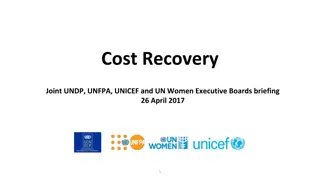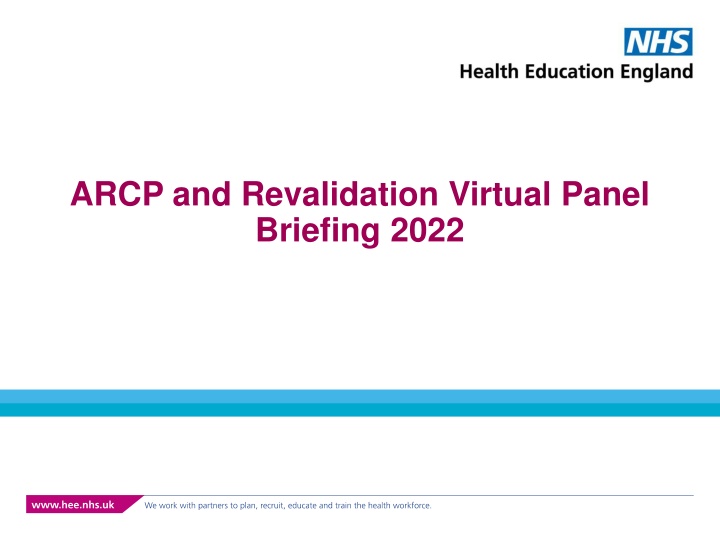
ARCP and Revalidation Panel Briefing 2022 Summary
Understand the purpose of the ARCP, role of the Panel Chair, jobs delegated to panel members, and the Lay Representative role in the context of medical training and revalidation. Get insights into what evidence is required for satisfactory progression, how panel chairs meet trainee requirements, and the tasks involved in completing ARCP outcome forms. Explore the usual functions of Lay Representatives and their role in ensuring the correct process is followed.
Download Presentation

Please find below an Image/Link to download the presentation.
The content on the website is provided AS IS for your information and personal use only. It may not be sold, licensed, or shared on other websites without obtaining consent from the author. If you encounter any issues during the download, it is possible that the publisher has removed the file from their server.
You are allowed to download the files provided on this website for personal or commercial use, subject to the condition that they are used lawfully. All files are the property of their respective owners.
The content on the website is provided AS IS for your information and personal use only. It may not be sold, licensed, or shared on other websites without obtaining consent from the author.
E N D
Presentation Transcript
ARCP and Revalidation Virtual Panel Briefing 2022
What is the ARCP for? To consider and approve the adequacy of the evidence and documentation provided Does the available evidence enable a panel to confirm that progress has been satisfactory? If yes, confirm what stage of training the trainee progresses to If not, why? What evidence needs to be provided to allow satisfactory progression? To consider time out of training and adjust CCT date as required (must be considered in cases of > 14 days TOOT, LTFT and OOP) To provide advice to the RO on revalidation @NHS_HealthEdEng
Role of Panel Chair To meet trainee ARCP and revalidation requirements, the panel chair will need to confirm that: 1. A review has taken place that covers the full scope of the doctor s work since the last ARCP A review of training progression since the last ARCP has been undertaken Appropriate supporting evidence has been presented Agreement has been reached about any necessary actions for the next year There are no outstanding causes for concern about the trainee s fitness to practice across their full scope of practice ARCP outcome form has been completed in full and submitted on Eportfolio, or completed on paper, on the day of the ARCP 2. 3. 4. 5. 6. @NHS_HealthEdEng
Jobs to delegate to panel members Completing ARCP outcome forms on Eportfolio or paper (it is essential to complete Revalidation section) Remember, those completing dual training will need an outcome form for both specialties being assessed Form R checking Wider scope of practice Completing Educational Supervisor Feedback forms via online form or paper form @NHS_HealthEdEng
Lay Rep role Not currently used At present, due to COVID-19, there are NO Lay Reps on panels however, please read the below information to learn about their usual function. 4.60 - They should review at least a random 10% of the outcomes and evidence supporting these and any recommendations from the panel about concerns over performance (paragraph 4.102). 4.61 The lay advisor should not be asked to judge whether the ARCP outcome awarded to the trainee is appropriate or whether the trainee has made satisfactory progress 4.61 The lay advisor may be asked on occasion to contribute a lay perspective to inform elements of the ARCP panel s activities but the role is to ensure the process is followed correctly, not to give an opinion on the outcome or the trainee s progress 4.63 If either the lay advisor or the external advisor has concerns about the outcomes from the panel, these will be raised with the Postgraduate Dean for further consideration. @NHS_HealthEdEng
Evidence Educational Supervisors Report Documented assessments used to inform ESR Form R (Part B) Revalidation Evidence held by HEE, i.e. Exception Exit Report Academic report (if applicable) Additional report from TPD (if applicable) Eportfolio is the evidence there? @NHS_HealthEdEng
The ARCP outcomes Achieving progress and competences at the expected rate 1 Development of specific competencies required, additional training time not required 2 Inadequate progress by the trainee additional training time required 3 Released from training programme with or without specified competences 4 Incomplete evidence presented 5 Gained all required competencies for the programme 6 Out of Programme for Research, Experience or Career Break 8 For Unsatisfactory outcomes (see next slide) U Codes For trainees who did not have an ARCP (see next slide) N Codes COVID-19 No fault outcomes Please see separate PPT for info 10.1 or 10.2 @NHS_HealthEdEng
U codes and N codes U code examples N code examples Sick leave Record keeping Parental leave Inadequate experience Not in post long enough Poor engagement Inter Deanery transfer Suspension Exam failure Resignation (with/without training issues) Requiring additional support NOTE: COVID outcomes require C Codes See the Coding for ARCPs document for more detailed information on these. @NHS_HealthEdEng
Outcome 5 An outcome 5 should really only be used when the documentation is not there, not when the trainee hasn t managed to quite complete everything They have 2 weeks to supply the evidence following an outcome 5 Please make clear on the ARCP outcome form what evidence was not there so subsequent review is easy Provide authority to the chair to issue outcome 1 if submitted @NHS_HealthEdEng
Appeal by trainees Trainees can appeal outcomes 2, 3 and 4 Outcome 2 review stage only. Same panel will review all previous and any additional evidence submitted by the trainee. No further right to appeal Outcome 3 + 4 review stage (as above). If decision unchanged and trainee still disagrees with decision, can request a further appeal, with an entirely independent panel @NHS_HealthEdEng
Academic Trainees ACFs, ACLs or trainees completing OOPR will also need their academic progress reviewed Trainees are asked to complete an Academic Progress Report with their Academic Supervisor to confirm what progress has been made. There are separate academic outcomes alongside the clinical outcomes; these are: Continue on academic component Do not continue on academic component Academic component completed Academic representatives are not currently obligatory on the panel. Arranging for an Academic rep to look at any academic parts of the trainee s portfolio should be arranged before the virtual panel. An academic representative should be present if it is anticipated that an academic trainee will be awarded an outcome 2, 3 or 4. @NHS_HealthEdEng
Fitness to practise Form R Part B + Educational Supervisor Report + Exception/Exit Reports from Trusts held by HEE Concerns are fed back to the Postgraduate Dean via revalidation section of the outcome form; ensure revalidation section fully completed. If any revalidation concerns have been discussed by the panel and deemed resolved this fact must be noted in the revalidation comments box @NHS_HealthEdEng
How the ARCP should run In absentia consider evidence. Complete e- portfolio based forms. All panel members will have access to the ePortfolio s prior to the date of the panel. Looking through the portfolio s before the panel can help to identify any trainees who may receive adverse outcomes (2-4). If an adverse outcome is to be issued, a Deans Rep or HoS should be on the panel. In the event this cannot be arranged, the TPD should seek guidance on whether outcome 3 or 4 is appropriate, or if a COVID outcome can be utilised instead, before the ARCP date @NHS_HealthEdEng
How the ARCP should run We can arrange for trainees to join the virtual panel. In this case the panel should review the evidence and decide the outcome before admitting the trainee to the virtual meeting. Panel Members introduce themselves to the trainee After this, the trainee should be informed of the outcome recommended by the panel it is not a process of negotiation If you wish to clarify anything with a trainee invite them in, discuss, then send out again while you deliberate @NHS_HealthEdEng
What is the ARCP not for? Sorting out training issues - these can be fed back to the local unit or HEE Sorting out personal issues offer support (i.e. PSU) confirming who will complete referral. Document what support has been offered/accepted and feedback to the appropriate person Making a decision about fitness to practise panel should flag concerns for the Postgraduate Dean s attention Career advice give if you have time but this is not a primary purpose for the ARCP panel. @NHS_HealthEdEng
PSW The Professional Support & Well-being Team is available for trainees requiring support in addition to that available locally and through the programme leaflets available. Trainees can self refer for; exam support (Form E) Impacted by COVID-19 (Form C) Trainees can also be referred by an educator (Form F) Forms can be accessed via the website: https://heeoe.hee.nhs.uk/psw/how-refer @NHS_HealthEdEng
Dont forget Try to keep to time Take regular scheduled breaks Introduce all panel members to each trainee Deliver the outcome to trainee at start of ARCP before any discussion takes place Ensure all paperwork is completed in full on the day Remember dual specialties for medicine will need an outcome form for each specialty (i.e. 1 for Specialty, 1 for GIM) Ensure revalidation evidence is recorded To record clearly reasons for outcomes 2-4 in case of appeal and give details to explain any COVID outcomes @NHS_HealthEdEng



